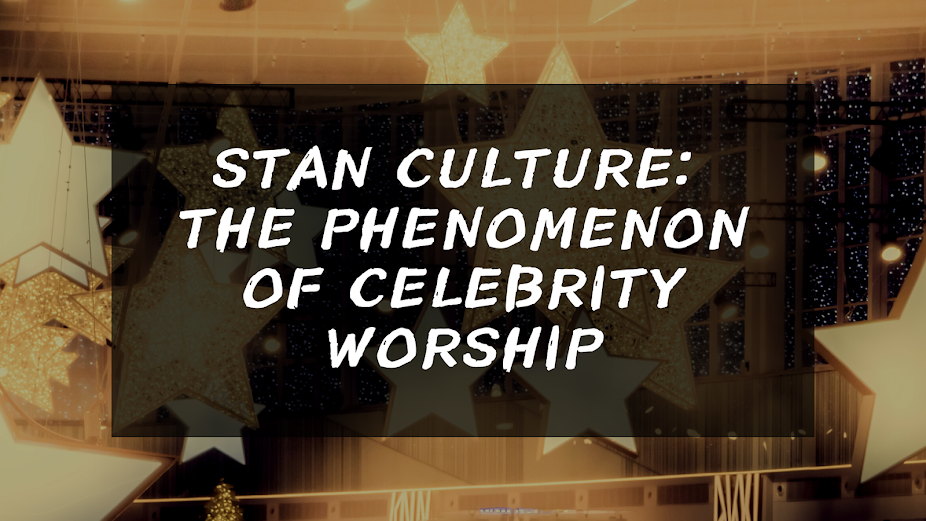The term ‘stan’ is used to show support and admiration for a celebrity. It is another term to say that you idolize someone or something, and it has been normalized to be a stan of somebody. Stan culture has always been mainstream, especially among younger people or teenagers. When we’re talking about celebrities, without dedicated and supportive audiences, they would be just like the rest of us. However, it is bizarre that celebrities can make us as a society, put them high and worship them to the point that we as humans can lose our morality towards each other or even ourselves. Pretty obvious to say that nowadays this phenomenon has almost entirely intrigued our generation.
The main concept of celebrity worship itself is a form of almost obsessional behavior where someone idolizes their favorite celebrity to the point of ‘worship’ (Brooks, 2018). This behavior can be seen when an individual wants a certain involvement in their idol’s life. One of the factors of relationship between celebrity worship and an individual is media consumption (television, social media, etc.) In today’s generation, people use media like these to satisfy their needs for entertainment. However, being a stan of a celebrity doesn’t always correlate with an obsessive feeling towards them. For example, when someone stan a singer or actor, it could simply because they like it and make them feel much better by listening or watching their work they put out for fans.
Focusing on celebrity worship, when celebrities reach a higher level of fame, people started purposely treating them solely for entertainment. The private life of a celebrity will be intruded by paparazzi, and even few fans might think they’re entitled enough to stay in front of their house to show their support. Fortunately, a lot of people do agree that this behavior is very creepy and disrespectful. However, people with this entitled mindset do exist, and it is not few of them. These cases happen way too many times among celebrities, especially the ones with a higher level of fame like Justin Bieber, Taylor Swift, Kendall Jenner, and many others.
This phenomenon does not only happen in western industries but also way too often in KPOP industries. Celebrity worshiping in KPOP industries is way too normalized and a lot of people do not realize it. This is heavily influenced by social media like Instagram, Twitter, and TikTok. When you’re on a platform like Twitter, you can witness the amount of people fighting and bullying each other every single day for the sake of defending their favorite celebrity. A lot of people lose their sense of morality by putting their favorite artist and treating them like they’re demigods. It is very toxic, but only a few realize that it is not okay. Have you ever felt the pressure to vote for your favorite artist on music shows or raise a hashtag on Twitter to show your support toward your favorite artist or the need to fight against other people on the internet to defend your favorite artist? When someone does not participate in doing things like these, others start guilt-tripping and accusing them for being a fake fan.
Celebrity Worship is usually measured by Celebrity Attitude Scale (CAS). There are three dimensions of celebrity worship:
1. “Entertainment social” – people see celebrities as a consumable product for their own entertainment, being a source of social interaction with others, for example like following artists on social media.
2. “Intense personal” – people who take social cues from celebrities and use them as a source of self-esteem and personality, like when someone copies their favorite celebrity outfits or purchases the product they endorse.
Stan culture isn’t always linked with negativity. Research has shown that the positive side of being a fan is mainly on ‘fandom’ and the relationship or connection with other fans, suggesting that this can have a positive impact in terms of belongingness, and psychological benefits. The case of celebrity worship, there is some evidence that it can be positive. Teenagers stated that celebrity worship provided inspiration, helped develop self-determination, enhanced personal and social relationships, helped modulate negative emotions, exposed them to new cultures, introduced new friends, and also helped overcome shyness (Ang & Chan, 2016). However, we should be clear when it is out of proportion. What we need to change is our mindset and the actual industry behind celebrities. The production of celebrities makes them profitable for many people and corporations; therefore, little regard is paid to the ethics of celebrity production itself.
References
Ang, C.-S., & Chan, N.-N. (2016). Adolescents’ Views on Celebrity Worship: A Qualitative Study. Current Psychology, 37(1), 139–148. https://link.springer.com/article/10.1007/s12144-016-9497-0
Brooks, S. K. (2018). FANatics: Systematic literature review of factors associated with celebrity worship, and suggested directions for future research. Current Psychology, 40(2), 864–886. https://link.springer.com/article/10.1007/s12144-018-9978-4#Abs1
Writer: Elisabeth Grisella Sampel
Editor: Ias Aprilia


Comments
Post a Comment